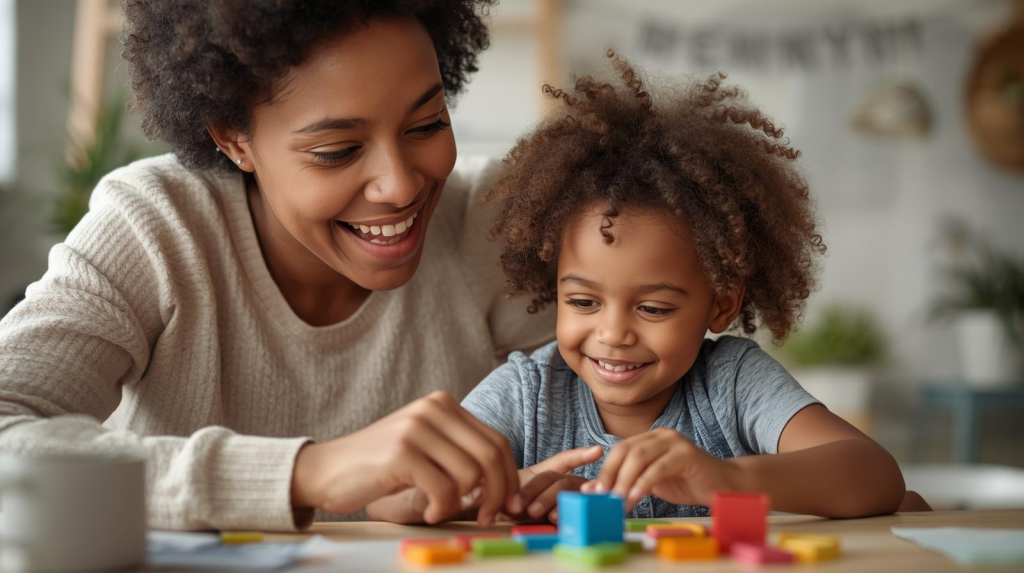This article explores the hopes and aspirations of parenting, highlighting the growth of both child and parent through shared experiences.

Parenting is a journey filled with hopes and dreams, not just for the child but for the parent too. Every parent wants their child to flourish, to become the best version of themselves. But in this pursuit, parents often find themselves growing and evolving alongside their children. This article delves into the aspirations that drive parents, the challenges they face, and the emotional connections that bind them to their children. It’s a reflection on how parenting can be a path of mutual growth and resilience.
Key Takeaway
- Parenting is a two-way street where both child and parent grow together.
- A positive outlook and realistic expectations are essential for navigating parenting challenges.
- Emotional connections foster resilience and confidence in both parents and children.
The Dual Journey of Growth

Parenting is often seen as a one-sided endeavor, where the focus is primarily on the child. However, it’s crucial to recognize that parents are also on a journey of growth. The hopes parents have for their children often reflect their own aspirations. For instance, a parent might wish for their child to be confident and resilient, qualities they themselves are trying to cultivate. This mutual growth can create a powerful bond, where both parties learn from each other.
Take, for example, a parent who encourages their child to take risks, like trying out for a school play. In doing so, the parent might confront their own fears of rejection and inadequacy. This shared experience can lead to a deeper emotional connection, fostering an environment where both the child and the parent feel supported in their growth.
Shared Experiences
Shared experiences, like attending school events or participating in family activities, can deepen the connection between parent and child. These moments become memories that both can cherish, reinforcing their bond.
Parenting Goals for Child Growth
Setting goals is a fundamental aspect of parenting. Parents often dream of their children achieving great things, whether that’s excelling in academics, sports, or the arts. However, it’s essential to approach these goals with a mindset that balances ambition with realism.
Parents should consider what success looks like for their child. It might not always align with societal expectations. For instance, a child who enjoys painting may not be the next Picasso, but their passion for art can lead to personal fulfillment. Parents should encourage their children to pursue their interests, which can lead to a more profound sense of self and confidence.
Celebrating Small Wins
Recognizing and celebrating small achievements can motivate children. Whether it’s completing a homework assignment or mastering a new skill, these moments deserve acknowledgment.
The Growth Mindset in Parenting
Credits: Saddleback Parents
A growth mindset is crucial for both parents and children. This concept, popularized by psychologist Carol Dweck, emphasizes the belief that abilities can be developed through dedication and hard work. Parents who adopt this mindset are more likely to encourage their children to embrace challenges and learn from failures.
For instance, if a child struggles with math, a parent with a growth mindset might say, “It’s okay to find this hard. Let’s work on it together.” This approach not only helps the child improve academically but also teaches them resilience. They learn that setbacks are a part of the learning process, which can be a valuable lesson for life.
Modeling Growth Mindset
Parents can model a growth mindset by sharing their own challenges and how they overcame them. This openness can inspire children to approach their struggles with a similar attitude.
Navigating Parenting Challenges with Hope
Parenting is fraught with challenges, from sleepless nights with a newborn to the teenage years filled with emotional turbulence. In these moments, maintaining a hopeful outlook can make a significant difference.
Parents who focus on the positives, even in difficult situations, can model resilience for their children. For example, during a tough phase, a parent might remind themselves of the joy their child brings into their life. This perspective can help parents cope with stress and foster a nurturing environment for their children.
Finding Support
Sometimes, seeking support from friends or parenting groups can provide a fresh perspective. Sharing experiences with others can help parents feel less isolated in their challenges.
Emotional Connection in Parenting
The emotional bond between parent and child is one of the most critical aspects of effective parenting. This connection lays the foundation for a child’s emotional well-being and development. When parents show love and support, children are more likely to develop confidence and a sense of security.
Simple acts, like spending quality time together or actively listening to a child’s concerns, can strengthen this bond. Parents should strive to create an atmosphere where children feel safe expressing their feelings. This emotional connection not only benefits the child but also enriches the parent’s experience, leading to personal growth.
Active Listening
Practicing active listening can significantly enhance the emotional connection. When parents truly listen to their children, it shows that their feelings and thoughts are valued.
Positive Parenting Outlook
A positive parenting outlook can significantly impact a child’s development. Parents who approach challenges with optimism are more likely to instill the same attitude in their children. This doesn’t mean ignoring difficulties; rather, it’s about framing challenges as opportunities for growth.
For instance, if a child faces bullying at school, a parent can help them see it as a chance to develop resilience and empathy. By guiding children through tough situations with a positive lens, parents can help them build essential life skills.
Encouraging Optimism
Encouraging children to express gratitude and focus on positive aspects of their lives can foster an optimistic outlook. Simple practices, like discussing what went well during the day, can cultivate this habit.
Parenting Resilience and Hope
Resilience is a vital quality for both parents and children. Parenting can be overwhelming, and it’s easy to feel defeated during tough times. However, cultivating resilience allows parents to bounce back and continue to support their children.
One way to build resilience is through self-care. Parents should prioritize their well-being, whether that’s through exercise, hobbies, or simply taking time to relax. When parents take care of themselves, they’re better equipped to handle the demands of parenting. This, in turn, creates a more stable environment for children to thrive.
Building a Support Network
Having a reliable support network can enhance resilience. Friends, family, or even online communities can provide encouragement and advice during challenging times.
Belief in Children’s Potential
Every child has unique strengths and potential. Parents play a crucial role in recognizing and nurturing these qualities. A belief in a child’s potential can empower them to pursue their passions and dreams.
For example, if a child shows an interest in music, parents should encourage them to explore that interest, whether through lessons or simply providing opportunities to play. This belief not only boosts the child’s confidence but also strengthens the parent-child relationship.
Encouraging Exploration
Allowing children to explore various interests can help them discover their passions. Parents should support their children in trying new activities, even if they differ from their own interests.
The Parenting Self-Improvement Journey
Parenting is not just about raising children; it’s also about self-improvement. Parents often learn valuable lessons from their experiences, which can lead to personal growth.
Reflecting on one’s parenting style and being open to change can lead to better outcomes for both parent and child. For instance, a parent who realizes they’re too strict might choose to adopt a more flexible approach, allowing for a more open dialogue with their child. This willingness to adapt can lead to a more harmonious family dynamic.
Seeking Feedback
Parents can benefit from seeking feedback from their children. This can provide insights into how their parenting style affects their child’s development and emotional well-being.
Humility and Flexibility in Parenting
Humility is an essential trait for parents. No one has all the answers, and being open to learning can make a significant difference. Parents should be willing to admit when they’re wrong and adjust their approaches as needed.
Flexibility is equally important. Parenting is unpredictable, and being able to adapt to changing circumstances can help parents navigate challenges more effectively. Whether it’s adjusting a child’s bedtime routine or being open to new educational methods, flexibility can lead to a more positive parenting experience.
Embracing Change
Embracing change can lead to growth. Parents should view challenges as opportunities to learn and evolve, both as individuals and as caregivers.
Encouraging Child Flourishing
Every parent wants their child to flourish. This means not only achieving academic success but also developing emotionally and socially. Parents should create an environment that encourages exploration and self-discovery.
Encouraging children to try new activities, make friends, and express themselves can lead to a more well-rounded individual. It’s essential for parents to support their children’s interests, even if they differ from their own. This support fosters independence and confidence, allowing children to thrive.
Creating Opportunities
Parents can create opportunities for their children to engage in various activities, whether it’s joining clubs, participating in sports, or exploring creative outlets. These experiences can help children discover their strengths and passions.
Realistic Parenting Expectations
Setting realistic expectations is crucial in parenting. Parents often have high hopes for their children, but it’s essential to balance these aspirations with an understanding of each child’s unique abilities and challenges.
For instance, not every child will excel in academics or sports. Recognizing and accepting this can prevent undue pressure on both the child and the parent. Instead of focusing solely on achievements, parents should celebrate progress and effort, fostering a growth mindset in their children.
Adjusting Expectations
Parents should periodically reassess their expectations as their children grow and change. This flexibility can help ensure that goals remain attainable and supportive rather than overwhelming.
Parenting and Emotional Adjustment
Parenting can be an emotional rollercoaster. From the joys of a child’s first steps to the challenges of adolescence, parents experience a wide range of emotions. It’s important for parents to acknowledge these feelings and find healthy ways to cope.
Talking to other parents, seeking support, or even journaling can help parents process their emotions. This emotional adjustment not only benefits the parent but also sets a positive example for children, teaching them how to handle their feelings.
Practicing Self-Compassion
Practicing self-compassion can help parents navigate their emotional ups and downs. Understanding that it’s okay to feel overwhelmed can lead to healthier coping strategies.
Active Coping in Parenthood
Active coping strategies can help parents manage stress and challenges. Instead of simply reacting to situations, parents can take proactive steps to address issues. This might involve setting aside time for self-care, seeking help from friends or family, or finding resources to improve parenting skills.
By adopting an active approach, parents can model resilience for their children. They show that it’s okay to seek help and that challenges can be overcome with effort and support.
Developing Problem-Solving Skills
Encouraging children to develop problem-solving skills can empower them to handle challenges independently. Parents can guide their children through difficult situations, teaching them how to think critically and find solutions.
Conclusion
Parenting is a journey filled with hopes and aspirations for both the child and the parent. By focusing on mutual growth, setting realistic expectations, and fostering emotional connections, parents can create a nurturing environment that benefits everyone involved. It’s a path of resilience, learning, and love, where both parent and child flourish together. Embrace the journey, and remember that every challenge is an opportunity for growth.
FAQ
Is it selfish to focus on my own growth while raising my children?
Not at all. Your growth and your child’s growth are interconnected, not competing priorities. When you work on developing qualities like patience, resilience, or confidence, you’re not taking away from your child—you’re modeling these qualities for them. Children learn more from watching how you handle challenges than from what you tell them to do. By investing in your own development, you’re actually giving your child a powerful example of lifelong learning and self-improvement.
I have big dreams for my child, but I’m worried I’m putting too much pressure on them. How do I find balance?
The key is distinguishing between supporting your child’s potential and imposing your own unfulfilled dreams onto them. Ask yourself: “Is this aspiration coming from my child’s genuine interests, or from what I wish for them?” Balance comes from encouraging exploration while letting your child lead. If they show interest in music, support it—but if they’d rather play sports instead, adjust your hopes accordingly. Celebrate effort and progress rather than just achievements, and regularly check that your expectations match your child’s actual abilities and interests.
What if my child’s interests are completely different from what I hoped for them?
This is one of the hardest parts of parenting—letting go of the picture you had in your mind. Your child is their own person, not an extension of you or your dreams. A child passionate about art when you hoped for an athlete, or vice versa, is still a child discovering who they are. Your job is supporting their authentic self, not molding them into your vision. Often, when parents release their preconceived hopes and embrace who their child actually is, the relationship deepens and the child thrives in ways that are ultimately more meaningful than any specific achievement.
How do I maintain hope when parenting feels overwhelming and I’m constantly failing?
First, recognize that feeling like you’re failing is nearly universal among parents—it doesn’t mean you actually are failing. Parenting is relentlessly challenging, and some phases are harder than others. Maintain hope by focusing on small positives rather than perfection. Did you stay calm during one meltdown even if you lost it during another? That’s progress. Are there moments of connection even amid the chaos? Those matter. Also, seek support—talking with other parents often reveals that everyone struggles, which can be surprisingly comforting and hope-restoring.
I’m trying to teach my child resilience, but I feel like a hypocrite because I struggle with it myself. What should I do?
You don’t have to have mastered something to teach it—in fact, working on resilience alongside your child can be powerful. Share your own struggles appropriately: “I’m finding this hard too, but let’s keep trying.” Show them your process of bouncing back from setbacks. Children don’t need perfect parents; they need real ones who demonstrate that growth is lifelong and that everyone faces challenges. Your vulnerability, when shared thoughtfully, actually strengthens your credibility rather than undermining it.
How can I tell if my expectations for my child are realistic or too demanding?
Watch your child’s response. If they’re engaged and challenged but not constantly stressed or defeated, expectations are probably appropriate. If they’re anxious, avoidant, or their self-esteem is suffering, you may need to adjust. Also consider whether you’re comparing your child to others rather than to their own progress. A realistic expectation acknowledges your individual child’s abilities, temperament, and developmental stage. Ask yourself: “Am I setting this goal because it’s genuinely achievable and beneficial for my child, or because of external pressure or my own ego?”
I’m so focused on my child’s future success that I feel like we’re missing the present. How do I shift this?
This awareness is actually the first step toward change. Start by designating some time that’s purely about being present—no agenda, no teaching moments, just connection. Notice when you’re turning play into a lesson or turning every activity into preparation for something else. Practice asking yourself: “Will this moment matter more as a memory or as preparation?” Both have value, but if everything is about the future, you’re sacrificing the relationship you’re building now. Your child needs to feel valued for who they are today, not just who they might become.
What if I realize my parenting approach isn’t working? Is it too late to change?
It’s never too late to adjust your approach. Children are remarkably adaptable, and relationships can heal and grow at any stage. Acknowledging that something isn’t working takes courage and shows the kind of flexibility that leads to better parenting. You might tell your child age-appropriately: “I’ve realized I’ve been too focused on grades and not enough on whether you’re happy. I want to change that.” Most children respond positively when parents show genuine effort to improve. Change won’t happen overnight, but consistent effort toward a healthier dynamic makes a real difference.
How do I help my child develop a growth mindset when they get so discouraged by failure?
Model it consistently yourself. When you make mistakes, narrate your thought process: “I messed up dinner, but that helps me learn for next time.” When your child struggles, empathize first—”I know this feels frustrating”—then reframe: “Your brain is actually growing when you work through hard things.” Praise effort and strategy, not just outcomes: “I noticed you tried three different approaches” rather than just “Good job.” Make failure normal by sharing stories of successful people who failed repeatedly. The message is: struggle means you’re learning, not that you’re inadequate.
I want my child to be confident, but I also don’t want them to be unrealistic or arrogant. How do I balance this?
Confidence comes from genuine competence and self-knowledge, not from empty praise. Build real confidence by letting your child tackle appropriately challenging tasks and succeed through effort. Acknowledge both strengths and areas for growth honestly: “You’re really good at math, and writing is harder for you right now, which is normal—everyone has different strengths.” This creates realistic self-assessment. Arrogance comes from feeling you’re better than others; confidence comes from knowing your worth isn’t dependent on being better than anyone else. Teach empathy and humility alongside competence.
How much should I share my own struggles and imperfections with my child?
This depends on your child’s age and the nature of what you’re sharing. Young children need stability and shouldn’t bear the weight of adult problems, but they can handle age-appropriate honesty: “Mommy is feeling frustrated right now, so I need a minute to calm down.” Older children and teens can handle more: sharing how you dealt with friendship problems or work challenges can be instructive. The rule is: share in ways that model coping, not in ways that make your child feel they need to take care of you or that the world is overwhelming. Your struggles should teach, not burden.
What if my hopes for my child conflict with my partner’s hopes?
This requires honest conversation about values and priorities. Often, parents want similar things but have different ideas about how to achieve them. Find common ground: you probably both want your child to be happy, capable, and fulfilled—you just might disagree about the path. Discuss what’s truly important versus what’s preference. Sometimes you can each support different aspects of your child’s development. Where you can’t agree, consider letting your child’s own inclinations guide the decision. United parenting doesn’t mean identical views; it means respectful collaboration.
I feel guilty that I’m not the parent I hoped I’d be. How do I deal with this?
Parenting guilt is nearly universal, but it’s worth examining whether it’s motivating or just destructive. If guilt prompts you to make positive changes, it’s useful. If it’s just making you feel terrible without leading anywhere, it’s not serving you or your child. Ask yourself: “What specifically am I feeling guilty about?” Then: “Is this something I can change, or am I holding myself to impossible standards?” Often, adjusting expectations is more helpful than trying harder. Your child doesn’t need the perfect parent you imagined becoming—they need the real, trying-their-best parent you actually are.
References
- https://kidshealth.org/en/parents/nine-steps.html#:~:text=Focusing%20on%20your%20needs%20does,to%20model%20for%20your%20children.
- https://www.sciencedirect.com/science/article/pii/S0191886925002247







